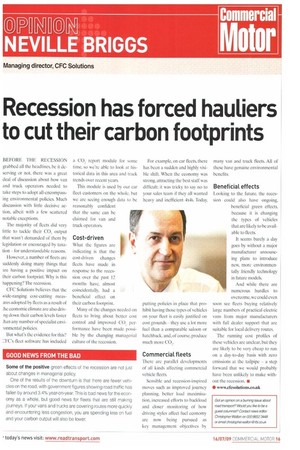Recession has forced hauliers to cut their carbon footprints
Page 16

If you've noticed an error in this article please click here to report it so we can fix it.
BEFORE THE RECESSION grabbed all the headlines, be it deserving or not, there was a great deal of discussion about how van and truck operators needed to take steps to adopt all-encompassing environmental policies. Much discussion with little decisive action, albeit with a few scattered notable exceptions.
The majority of fleets did very little to tackle their CO, output that wasn't demanded of them by legislation or encouraged by taxation for understandable reasons.
However, a number of fleets are suddenly doing many things that are having a positive impact on their carbon footprint. Why is this happening? The recession.
CFC Solutions believes that the wide-ranging cost-cutting measmes adopted by fleets as a result of he economic climate are also drivng down their carbon levels faster :han any number of specialist envi7onmental policies.
But what's the evidence for this? :FC's fleet software has included a CO, report module for some time, so we're able to look at historical data in this area and track trends over recent years.
This module is used by our car fleet customers on the whole, but we are seeing enough data to be reasonably confident that the same can be claimed for van and truck operators.
Cost-driven
What the figures are indicating is that the cost-driven changes fleets have made in response to the recession over the past 12 months have, almost coincidentally, had a beneficial effect on their carbon footprint.
Many of the changes needed on fleets to bring about better cost control and improved COL, performance have been made possible by the changing managerial culture of the recession.
For example, on car fleets, there has been a sudden and highly visible shift. When the economy was strong, attracting the best staff was difficult: it was tricky to say no to your sales team if they all wanted heavy and inefficient 4x4s. Today, putting policies in place that prohibit having those types of vehicles on your fleet is easily justified on cost grounds they use a lot more fuel than a comparable saloon or hatchback, and, of course, produce much more CO,.
Commercial fleets
'there are parallel developments of all kinds affecting commercial vehicle fleets.
Sensible and recession-inspired moves such as improved journey planning, better load maximisation, increased efforts to back load and closer monitoring of how driving styles affect fuel economy are now being pursued as key management objectives by many van and truck fleets. All of these have genuine environmental benefits.
Beneficial effects
Looking to the future, the recession could also have ongoing, beneficial green effects, because it is changing the types of vehicles that are likely to be available to fleets.
It seems barely a day goes by without a major manufacturer announcing plans to introduce new, more environmentally friendly technology in future models.
And while there are numerous hurdles to overcome, we could even soon see fleets buying relatively large numbers of practical electric vans from major manufacturers with full dealer support that are suitable for local delivery routes.
The running cost profiles of these vehicles are unclear, but they are likely to be very cheap to run on a day-to-day basis with zero emissions at the tailpipe a step forward that we would probably have been unlikely to make without the recession. • • www.cfcsolutions.co.uk




















































































































































